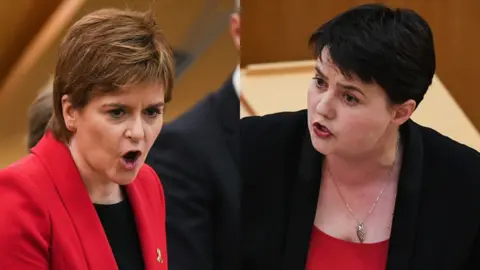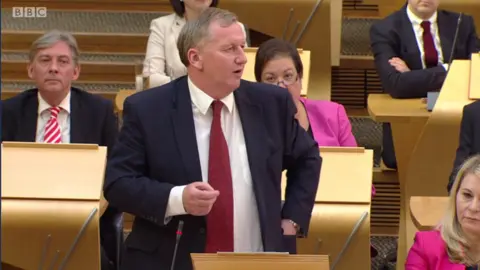Ruth Davidson warns Nicola Sturgeon over income tax rise
 Getty Images
Getty ImagesThe Scottish Conservative leader has claimed that Nicola Sturgeon could be "coming for your pay cheque" by raising taxes for low and middle earners.
Ruth Davidson was speaking as she urged Ms Sturgeon to rule out any increase in the basic rate of income tax.
Ms Sturgeon said she wanted a genuine, open-minded debate on taxation, and would not rule anything out in advance.
But the first minister said she would not transfer the "burden of austerity" onto those who can least afford it.
The exchange came after Ms Sturgeon used her legislative programme for the coming year to signal the start of a discussion on "responsible and progressive use of our tax powers".
The SNP's Holyrood election manifesto in 2016 ruled out increasing the basic rate of income tax for the lifetime of this parliament.
Ms Davidson pressed her on the issue at the first session of First Minister's Questions after MSPs returned to Holyrood following the summer recess.
The Tory leader said discussions on tax should "begin right now", as she made clear: "I am opposed to all current basic rate tax payers paying more in income tax."
She then called on the first minister to confirm whether this was her position too.
The SNP leader responded: "Usually when opening a debate and when you commit to listening to what others have to say, it makes sense to carry on and do that before ruling things out in advance."
She pledged her government would "not simply transfer the burden of austerity on to the shoulders of those who can least afford it".
Westminster austerity
Ms Sturgeon went on to say: "As we look forward over the next few years we owe ourselves a genuine debate about what kind of society and economy we want to be.
"We know that we face further Westminster austerity, imposed by Ruth Davidson's party, we know that we face the implications of Brexit, implications Ruth Davidson thinks the country might never recover from, and there are a range of other pressures - demographic pressures for example.
"So if we want, as I certainly do, this country to continue to have the highest quality public services, well paid public servants, the support and the infrastructure that our businesses need to thrive, if we want to have effective policies to tackle poverty, then I think we do need to have an honest, mature debate about how best to deliver that."
Ms Davidson retorted: "I think anyone earning less than £43,000 a year in Scotland just heard the first minister's message loud and clear - she's coming for your pay cheque."

The session also saw Alex Rowley question Ms Sturgeon for the first time as Scottish Labour's interim leader.
Mr Rowley had been Kezia Dugdale's deputy before she stood down last week.
He used his time to highlight the long waits for mental health treatment facing many young people in Scotland, saying that 9,000 children had been forced to wait too long for treatment since the introduction of a key waiting target in 2014.
The government set a standard of a maximum wait of 18 weeks from a patient's referral to treatment for specialist Children and Adolescent Mental Health Services, to be met for at least 90% of patients.
'Let down'
Mr Rowley said the target had never been met, adding: "Too many children in Scotland are being let down".
He told Ms Sturgeon: "We actually need action, action speaks louder than words.
"How many times does the issue of children's mental health services need to be raised in this parliament before you and your government will do something about it?"
Ms Sturgeon acknowledged there was more work to do but said Labour's characterisation of the government's response was a "tad unfair".
A review of rejected referrals was under way and a commitment had been made to review personal and social education in schools, she said, highlighting again the government's wish to have a conversation on the use of income tax powers.
The first minister added: "We're seeing rising demand for mental health services, that puts an onus on the government to make sure that the services are there.
"We are committed to the work to ensure that that is the case so we do see improvement in waiting times for example, we see a significant increase in the mental health workforce to support those expanded services and we'll continue to take the action and invest the resources that bring about those improvements."
